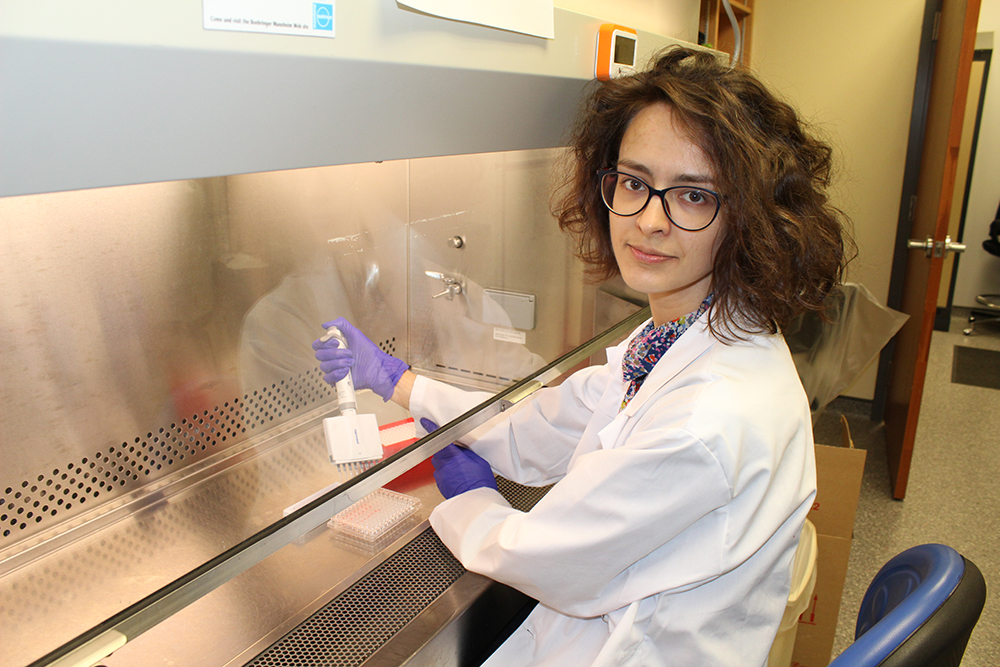
Helgi Kuzmychova working in the cell culture hood to develop treatment-resistant brain cancer cells and use them to test new therapeutic agents.
Rady grad student profile: Helgi Kuzmychova studies glioblastoma and its resistance to therapies
Helgi Kuzmychova has always been fascinated by molecular biology, particularly with how it relates to cancer research.
Kuzmychova, a master’s student in pathology at the Max Rady College of Medicine, moved to Winnipeg in January 2020 to study at UM. Born and raised in Ukraine, she received her first degree, a bachelor’s in biotechnology, at University of Wroclaw in Poland.
While in the genetics program, Kuzmychova began volunteering with Dr. Tanveer Sharif, assistant professor of pathology and Canadian Cancer Society Emerging Scholar. Working with Sharif led her to pursue graduate studies in pathology.
Earlier this year, Kuzmychova, 25, received $17,850 in funding from Research Manitoba for a project titled Therapeutic targeting of metabolic adaptations to circumvent therapy resistance in glioblastoma.
UM Today spoke with Kuzmychova about her journey to UM and passion for molecular biology.
You came to Winnipeg in January 2020. How was it starting a new program in a new country during the early days of the pandemic?
I stepped off the plane on Jan. 1, 2020. It was a very interesting time. Adjusting to a new environment can be challenging, especially when you have to become familiar with a new learning system. The academic advising services and student orientation were incredibly helpful in getting me settled. By March, when the pandemic hit hard, I felt ready to handle the challenges that came my way. Also, my family friend lives in the city and she gave me accommodation and all the possible support when students were encouraged to move out of the dormitories due to self-isolation regulations. All in all, by means of good human nature and community support, the start of the pandemic went much smoother for me than I anticipated.
Why did you choose UM for your current program?
I entered the pathology master’s program at the University of Manitoba largely because Dr. Sharif kindly welcomed me into his lab as a volunteer during my undergrad studies and I greatly enjoyed our collaboration. Dr. Sharif’s research areas in cancer and molecular biology have always fascinated me: the way in which normal body cells can become malignant and how it happens on the molecular level. Proceeding with the master’s program in Dr. Sharif’s lab was a chance I couldn’t miss.
What inspired you to pursue your field of study?
Cancer is a huge issue that strikes many families and brain cancer has a very poor prognosis. I was always interested in how normal cells in our bodies can become so vicious and malignant. In Dr. Sharif’s lab we are currently looking at glioblastoma cells that are resistant to chemoradiotherapy and how it correlates with changes on molecular and metabolic levels.
What is the most interesting thing you’ve learned in your graduate studies?
I learned to appreciate the complexity of processes inside the cell. As a student, you become familiar with numerous biological concepts, but they remain abstract to you. We study how metabolic pathways intervene with other processes to support cancer cells’ growth and resistance, and the intricacy of these interactions never fails to fascinate me.
What has been most rewarding during your time at UM?
I would say the very moment of discovery is one of the most rewarding experiences in my life. I’m not even talking about big findings, but even small things. No matter how small your observation is, for a short period, you’re the only person in the world who possesses this information. It’s a fascinating feeling.
What are your plans when you finish your studies?
I like research and hope to proceed further with the academic career. Our department of pathology had a PhD program approved this April, so I’d like to continue my research path and advance academically.
This Q&A is part of a series on UM Today this summer featuring Rady Faculty of Health Sciences graduate students. You can find more grad student profiles here: #Radygradstudents.






